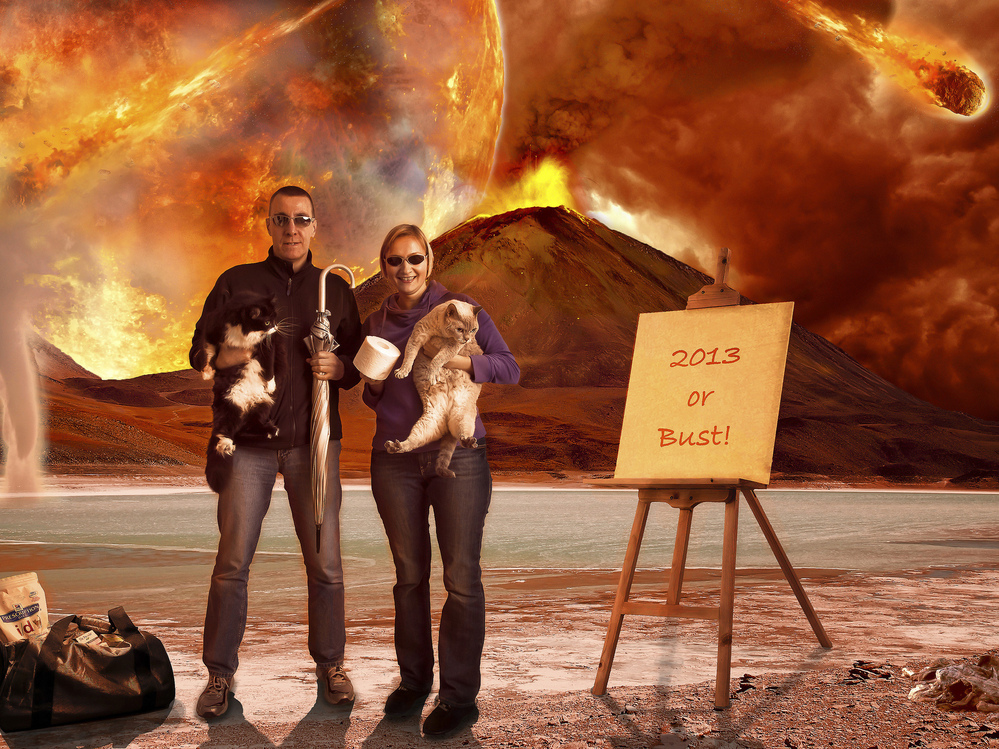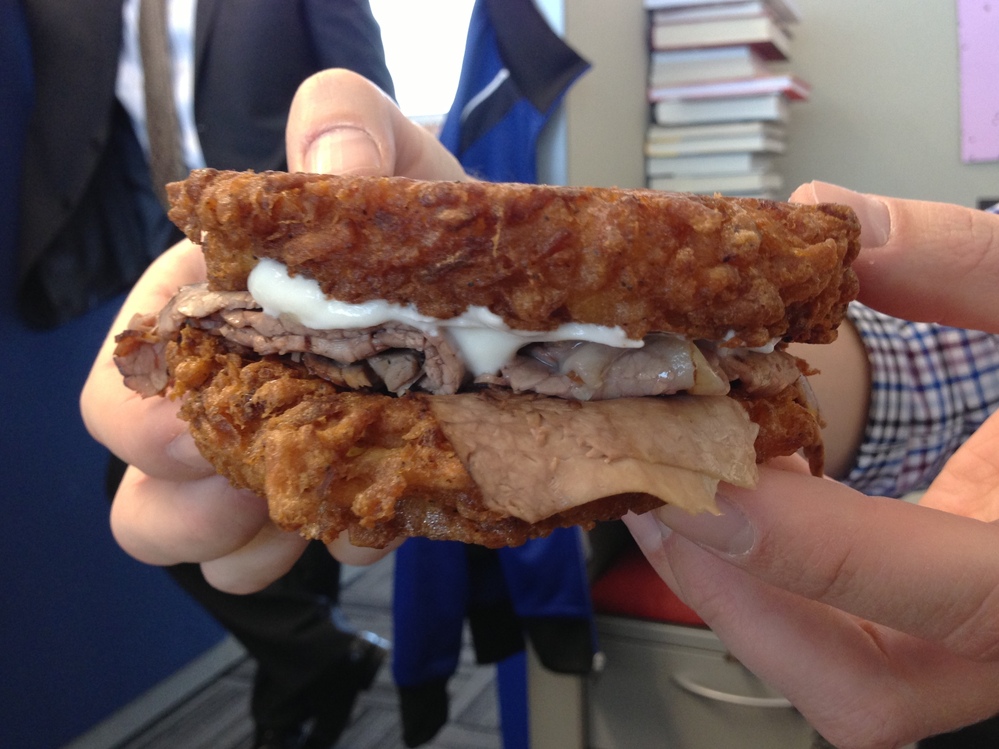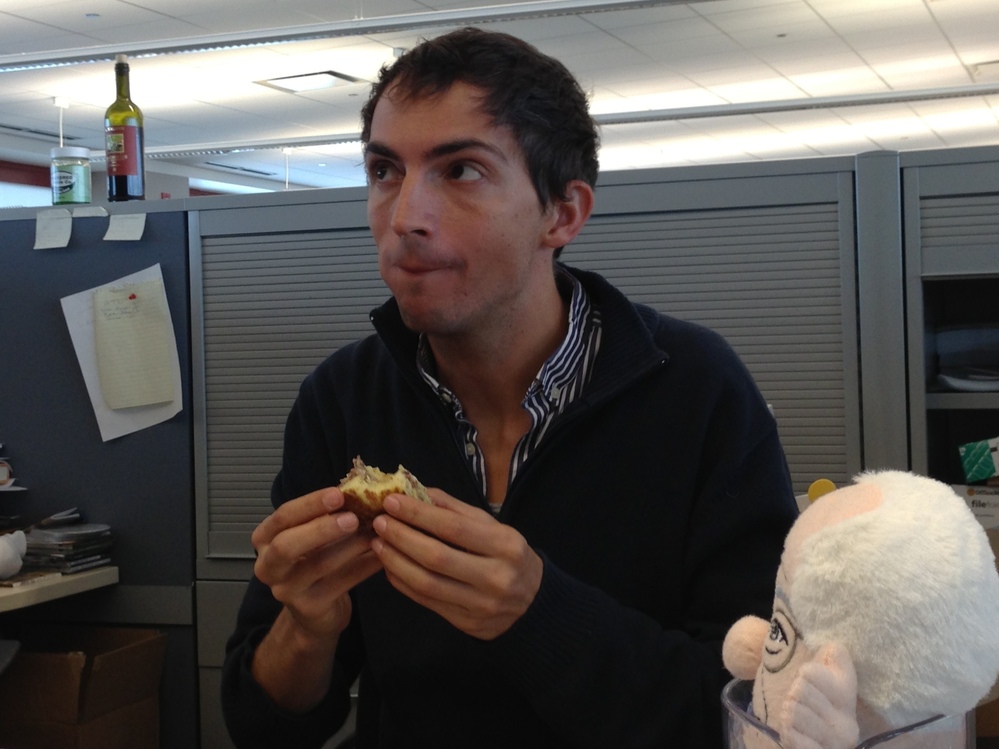
Frederick M. Brown/Getty Images
America is obsessed with Downton Abbey, the British series about a family so wealthy that they can't feed, clothe or care for themselves. Hugh Bonneville plays the patriarch of the family, and we've invited His Lordship to play a game we're calling, "Welcome to America, Lord Grantham."
Since Downton Abbey shows us British culture at its height, we've decided to create a quiz about the American equivalent — the TV show that shows America not only as it is, but as we most wish it to be. He'll answer three questions about TLC's Here Comes Honey Boo Boo.
Copyright © 2012 National Public Radio. For personal, noncommercial use only. See Terms of Use. For other uses, prior permission required.
PETER SAGAL, HOST:
And now, the game where people do something dumb to take a break from being so smart the rest of the time. America is obsessed with "Downton Abbey," the great British series - yes, we all love it.
(APPLAUSE)
SAGAL: It's about a family so profoundly stupid, they can't feed, clothe, or care for themselves in any way.
(LAUGHTER)
SAGAL: Oh, I'm sorry. My mistake. They're not stupid, they're rich.
(LAUGHTER)
SAGAL: Hugh Bonneville plays the patriarch of the family, Lord Grantham, and we are delighted to welcome his Lordship to WAIT WAIT...DON'T TELL ME! What a pleasure to see you.
(APPLAUSE)
HUGH BONNEVILLE: Thank you. It's lovely to be here.
SAGAL: Now, I've been watching the show and really loving it, but I'm not clear to the protocol. So how should we address you? Milord? Your Grace?
(LAUGHTER)
BONNEVILLE: Hugh.
SAGAL: Hugh. Nobody on the show calls you that, but all right, we'll go with that. People I know and admire and work with and are friends with loved the show. I would say, what's it about?
They'd say, well, you know, it's all about the love affairs, and the clothes and the intrigue of who's in love with whom. I'm like, oh, that's a soap opera. Great, I'm not interested. And then I started watching it, and it is absolutely great. And it has made me into an idiot.
(LAUGHTER)
SAGAL: I used to care about important things, and now I'm like, oh dear, will Lady Mary accept Mr. Crowley's proposal? I don't know.
(LAUGHTER)
SAGAL: I can't stop. Can you explain why this show is so compelling?
BONNEVILLE: I genuinely don't know. I'm delighted, but I don't know why.
SAGAL: Yeah.
BONNEVILLE: I think one of the things is that Julian Fellowes, who writes every episode, is a huge fan of a soap we have in Britain called "Coronation Street."
SAGAL: Right. That was a classic soap that's been on for many, many years.
BONNEVILLE: Yeah. And he's also a great fan of "The West Wing."
(APPLAUSE)
BONNEVILLE: So if you put the soap elements and the pace of "The West Wing" and a bit of period drama, so you think you're watching something intelligent, then....
(LAUGHTER)
BONNEVILLE: Then you've got a recipe for something.
SAGAL: Right.
BONNEVILLE: But I think, over and above that, the production aims high. Whether it succeeds every time, I don't know, but it's set in a beautiful castle in the south of England. Yorkshire, sorry, in the north of England, but we film it in the south. And, you know, you...
MAZ JOBRANI: Wow, you must have a really great zoom lens.
(LAUGHTER)
BONNEVILLE: I don't know, I think you could analyze it to death, but please don't, just stay watching it.
SAGAL: I will. We'll be happy to. One of the things about the show is a lot of the appeal, even to me, a schlub like me, is the extraordinary grace, and the clothing and the design of the home and all the accoutrement. If the show is so much about elegance and a way of living that I can only aspire to or imagine aspiring to, why does every episode begin with the shot of a dog's butt?
(LAUGHTER)
SAGAL: It's the weirdest thing. It's like we've got a palace, we've got these beautiful actors, we've got motorcars, but let's start with the dog's butt.
BONNEVILLE: And my name next to it.
SAGAL: Exactly.
(LAUGHTER)
BONNEVILLE: Someone up there hates me. I don't know. I don't know why. It's an interesting opening choice. But it's become a bit of a thing about the show now.
SAGAL: Yeah.
BONNEVILLE: Hound's bum.
SAGAL: Really?
BONNEVILLE: Yeah.
SAGAL: That's what they call it.
BONNEVILLE: Hash tag hound's bum.
(LAUGHTER)
SAGAL: I'm actually very curious, is it - do you know - historically accurate in the sense that it depicts...
BONNEVILLE: Yes, dogs have always looked like that, from behind.
(LAUGHTER)
(APPLAUSE)
BONNEVILLE: Sorry about that.
SAGAL: In the sense that is this how people of that station lived at that time?
BONNEVILLE: I think it - as I said earlier, I think it aspires to some degree of authenticity. And if it makes someone reach for the history books and learn a bit more about that era, terrific. But no, ultimately, it's a fiction. But we do have a wonderful historical adviser on set, a guy...
PAULA POUNDSTONE: Does he drink?
(LAUGHTER)
POUNDSTONE: Hugh, do you know whether it's accurate or not?
BONNEVILLE: No.
SAGAL: Really?
BONNEVILLE: No, no.
POUNDSTONE: So if it makes someone else reach for a history book.
SAGAL: Right.
PAUL WALLICH: Yeah, yeah, yeah, not me, I'm too busy.
POUNDSTONE: Yeah.
(LAUGHTER)
ADAM FELBER: He's busy learning lines.
BONNEVILLE: Exactly.
POUNDSTONE: Oh, my mistake.
FELBER: And doing the fake British accent.
BONNEVILLE: Exactly.
SAGAL: Yeah, he's excellent.
(LAUGHTER)
FELBER: It doesn't maintain itself.
SAGAL: Do you ever, like, wonder? I mean, do you ever go to Julian Fellowes, the writer, and go, look, so you're telling me these incredibly wealthy, powerful people sit around the house all day, amusing themselves with walks and perhaps a horse ride if they're feeling really active, and then they just wait for someone to ring a gong, where they put on formal clothes.
(LAUGHTER)
SAGAL: And are fed dinner and then they all go to bed and don't have sex. Are you telling me that's...
(LAUGHTER)
SAGAL: That's how these people live?
BONNEVILLE: Peter, you're making it sound very shallow and silly.
SAGAL: No.
(LAUGHTER)
FELBER: Isn't there one guy who works? Someone's got to bring home the money. No?
SAGAL: No, nobody works. There's a thing where somebody says I have a job, and people are like "You have a job? A job?"
In fact, I don't know what Lord Grantham does. You always seem to be sitting there, writing at your desk. And I don't know what you're writing, because you have no job. Are you writing like all play and no work is pretty much my whole day. All play and no work is pretty much my - I mean, what?
(LAUGHTER)
POUNDSTONE: He's been filling out an application during several episodes.
(LAUGHTER)
SAGAL: Slightly more seriously, I am very impressed by, frankly, your performance. The fact that your role is to play this person who embodies this aristocracy and this position and this authority, and you do it fantastically well. You act like a lord. Did you have to - he does, does he not?
JOBRANI: Oh, he does.
(APPLAUSE)
POUNDSTONE: He seems like kind of a regular guy.
JOBRANI: Yeah.
SAGAL: Well that's my question; I mean what did you have to do?
FELBER: The tank top is a bit much.
SAGAL: What did you have to do?
(LAUGHTER)
SAGAL: I mean, to be the lord, what do you have to put yourself into to be the Lord Grantham?
BONNEVILLE: Oh my goodness, well, you know, you just put on the suit and follow Julian Fellowes around a bit. I mean he's a lord.
(LAUGHTER)
BONNEVILLE: It's just dressing up in frocks and prancing around. I love it.
(LAUGHTER)
SAGAL: I do that at home, but I try to keep it a secret, actually.
POUNDSTONE: Yeah.
SAGAL: There's, broadly speaking, one group of actors that play Lord Grantham and his family, another group of actors who play the downstairs servants. And obviously, on screen there's a very hierarchical relationship. Does that ever like seep into the offstage? I mean, do you find yourself asking, like the actor who plays the butler, to fetch you something from the craft table?
(LAUGHTER)
BONNEVILLE: Funnily enough, it's sort of the opposite. I mean, Sophie McShera, who plays Daisy, the kitchen maid, is a monster, absolute monster.
SAGAL: Really?
(LAUGHTER)
BONNEVILLE: "Bonneville. Get me some tea, Bonneville." She's always doing that.
SAGAL: Really?
BONNEVILLE: Oh yeah, terrible.
(LAUGHTER)
SAGAL: Well, Hugh Bonneville, we are delighted to have you with us. We've asked you here to play a game we're calling?
CARL KASELL: Welcome to America, Lord Grantham.
SAGAL: So, we were thinking, your show, "Downton Abbey," shows us British culture at its height. What would be the American equivalent, the TV show that not only shows America as it is, but as we most wish it to be? So we're going to ask you three questions about the show "Here Comes Honey Boo Boo," on TLC.
(LAUGHTER)
SAGAL: Do you know the show? It's the American "Downton Abbey."
BONNEVILLE: Right.
SAGAL: Much like - no, it is.
BONNEVILLE: Yes.
SAGAL: Much like "Downton Abbey" shows a British family dealing with the misfortunes and slings and arrows of time, so does Honey Boo Boo in different problems, same dignity. Carl, who is Hugh Bonneville playing for?
KASELL: Hugh is playing for Louise Garland of Los Angeles, California.
SAGAL: OK.
(APPLAUSE)
BONNEVILLE: Louise, I'll do my best.
SAGAL: "Here Comes Honey Boo Boo" is, as I'm sure you know, I'm sure everybody here knows, a reality show that follows the adventures of a 6-year-old girl named Alana, nicknamed Honey Boo Boo, who enters beauty pageants. Her nickname is obviously Honey Boo Boo.
What are the nicknames of the rest of her family? Is it A: Mama June, Sugar Bear, Pumpkin, Chubbs and Chickadee? B: Haily Joe, Joseph Joe, Mary Joe, Girly Joe, and Gwyneth? Or C: Angel Hair, Linguine, Ravioli, Mostacolli, and Cavatopi?
(LAUGHTER)
BONNEVILLE: Can you give me the first one again?
SAGAL: The first one was Mama June, Sugar Bear, Pumpkin, Chubbs, and Chickadee? The second one was...
BONNEVILLE: It's got to be that. It's got to be A. It's got to be A.
(APPLAUSE)
SAGAL: You're going to go for that? I'm just asking you.
BONNEVILLE: I'm going to go for A.
SAGAL: You're right. It is...
BONNEVILLE: Hey.
(SOUNDBITE OF BELL)
SAGAL: June is the mother, Sugar Bear the father, Pumpkin, Chubbs and Chickadee are Honey Boo Boo's sisters. That's good, Hugh. That was done in an aristocratic way. Here is your next question. Which of these is a real title of an episode in the first season of "Here Comes Honey Boo Boo?" A: "A Spoon, A Jar of Glue, and Trouble?"
(LAUGHTER)
SAGAL: B: "She Ooooohed Herself?" Ooooohed spelled O-O-O-O-O-H-E-D. Or C: "The End of Western Civilization?"
(LAUGHTER)
BONNEVILLE: I'm going to go with B.
SAGAL: You're going to go with B, "She Ooooohed Herself?"
BONNEVILLE: Yeah.
SAGAL: You're right, she ooooohed herself.
BONNEVILLE: Hey.
(SOUNDBITE OF BELL)
(APPLAUSE)
SAGAL: Here's the synopsis of "She Ooooohed Herself": Alana meets with a new pageant coach and learns her hardest routine yet. Then, the whole family throws Chickadee a baby shower. It was moving.
(LAUGHTER)
SAGAL: Here's your last question. The producers knew Honey Boo Boo's show would be a success when it did very well against another popular program being broadcast at the same time. What was it? Was it A: "The Walking Dead?" B: "The Late Show with David Letterman?" Or C: The third and final night of the Republican National Convention this year?
(LAUGHTER)
BONNEVILLE: The convention, C.
SAGAL: Yes, it was the convention.
JOBRANI: Hey.
POUNDSTONE: Whoa.
FELBER: Nice.
POUNDSTONE: Wow.
SAGAL: The fourth episode of "Here Comes Honey Boo Boo" was counter programmed against Mitt Romney's big night in Tampa, and it did really well. It beat all the cable networks, the news networks in the 18 to 14 demographic, which is why we still have Honey Boo Boo.
(LAUGHTER)
SAGAL: Carl, how did Hugh Bonneville do on our quiz?
KASELL: He had three correct answers, Peter. So, Hugh, you win for Louise Garland.
SAGAL: Well done.
(APPLAUSE)
FELBER: Hey.
JOBRANI: Hey.
SAGAL: Hugh Bonneville stars as Lord Grantham in Masterpiece Classic's "Downton Abbey." The third season begins in January. Hugh Bonneville, what a pleasure to meet you in person and to have you with us.
BONNEVILLE: Thank you.
POUNDSTONE: Thank you, Hugh.
SAGAL: Thank you so much.
(SOUNDBITE OF MUSIC)
Copyright © 2012 National Public Radio. All rights reserved. No quotes from the materials contained herein may be used in any media without attribution to National Public Radio. This transcript is provided for personal, noncommercial use only, pursuant to our Terms of Use. Any other use requires NPR's prior permission. Visit our permissions page for further information.NPR transcripts are created on a rush deadline by a contractor for NPR, and accuracy and availability may vary. This text may not be in its final form and may be updated or revised in the future. Please be aware that the authoritative record of NPR's programming is the audio.
View the original article here
 Pascal Le Segretain/Getty Images
Pascal Le Segretain/Getty Images  Photographer David Blackwell and his wife prepared for the apocalypse. Cats and cat food? Check. Toilet paper? Check. Exploding volcanoes and hurtling asteroids? Not so much.David Blackwell/Flickr
Photographer David Blackwell and his wife prepared for the apocalypse. Cats and cat food? Check. Toilet paper? Check. Exploding volcanoes and hurtling asteroids? Not so much.David Blackwell/Flickr 

 Robert befriends the sandwich before eating it.NPR
Robert befriends the sandwich before eating it.NPR  Ian has a religious experience.NPR
Ian has a religious experience.NPR  Phil Walter/Getty Images
Phil Walter/Getty Images  Frederick M. Brown/Getty Images
Frederick M. Brown/Getty Images